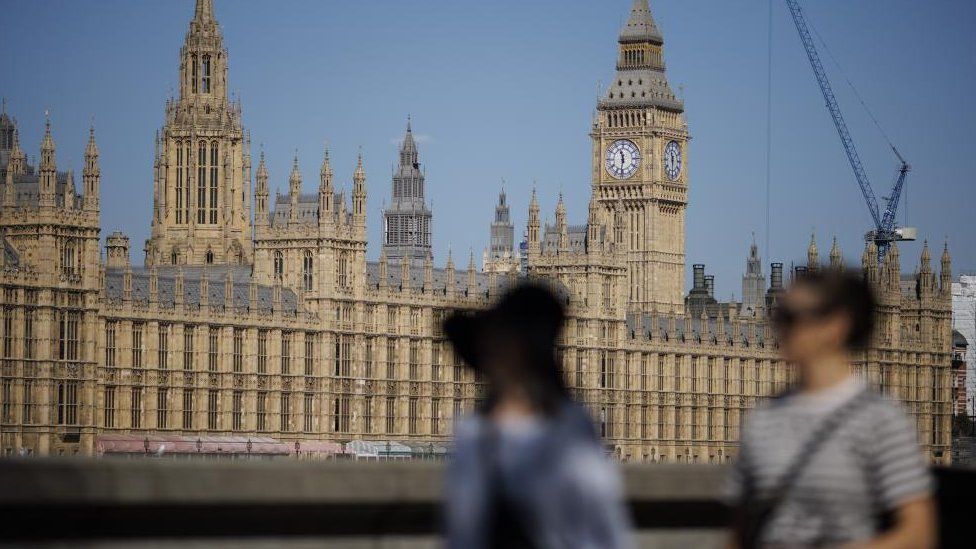Two men have been arrested under the Official Secrets Act, the Met Police has confirmed.
The Sunday Times reported that one of the men, in his 20s, is a parliamentary researcher accused of spying for China.
It is reported he had links to several Tory MPs, including security minister Tom Tugendhat and foreign affairs committee chairwoman Alicia Kearns.
He and another man in his 30s were arrested in March, the Met said, with three addresses searched by police.
Several government sources declined to comment on security matters.
The Met said: “A man in his 30s was arrested at an address in Oxfordshire and a man in his 20s was arrested at an address in Edinburgh.
“Searches were also carried out at both the residential properties, as well as at a third address in east London.”
Both men were taken to a south London police station, and were subsequently released on police bail until a date in early October, they said.
The Met’s Counter Terrorism Command, which oversees espionage-related offences, is investigating.
- UK approach to China spy threat inadequate – report
It is reported the researcher, who worked on international policy, had access to Mr Tugendhat before he became security minister in September last year.
Mr Tugendhat is said to have had only limited contact with the man, and no dealings with him as a minister.
The man has not been named – but the Sunday Times said he had lived in China for a period.
Conservative MP Alicia Kearns said she was aware of the paper’s report but declined to comment, adding: “While I recognise the public interest, we all have a duty to ensure any work of the authorities is not jeopardised.”
Chinese espionage concerns
The arrests will reignite the debate over London’s relationship with Beijing. There has been growing concern about Chinese espionage and also interference in Parliament, with questions about whether more action should have been taken to mitigate risks.
Last year, an unusual parliamentary interference alert was issued regarding the activities of Christine Lee.
MI5 alleged she had been carrying out political interference activities including donating funds to support the work of MPs. This was all said to be on behalf of China.
Other countries, notably Australia and Canada, have also seen recent claims of Chinese espionage or interference in politics, with the Chinese government denying any such activity.
Tensions have been increasing over both espionage and wider security threats in recent years – but the last few months has seen attempts by both Washington and London to stabilise relations with China.
The UK’s Foreign Secretary James Cleverly visited Beijing less than two weeks ago and told the BBC it would not be “credible” to disengage.

Reacting to the arrests,Conservative MP Iain Duncan Smith said it was “time for us to recognise the deepening threat that the CCP (Chinese Communist Party) under (President) Xi now pose”.
He also questioned the UK’s approach to China, adding: “What price was Cleverly’s kowtow visit to Beijing?”
Tory MP Tim Loughton said: “This is yet further evidence of how far the tentacles of the Chinese Communist Party (CCP) reach into British institutions.
“Yet again the security of Parliament has potentially been compromised, reinforcing how we cannot view the CCP as anything other than a hostile foreign threat.”
Parliament’s Intelligence and Security Committee issued a long-awaited report in July, warning that the government had been slow to come to terms with the security risks from Beijing.
“It appears that China has a high level of intent to interfere with the UK government, targeting officials and bodies at a range of levels to influence UK political thinking and decision-making relevant to China,” the report said.
It noted the challenges in prosecuting cases linked to espionage given that it was, at that time, not a criminal offence to be an agent of a foreign intelligence service.
MI5 and the wider intelligence community have long complained that the old Official Secrets Act was inadequate in dealing with hostile state activity. The US and Australia both have been able to use a wider range of powers.
National security legislation to provide new powers to investigate espionage and other security threats did come into effect this summer in the UK, but this was after the arrest of the two men which took place under the old Official Secrets Act.
